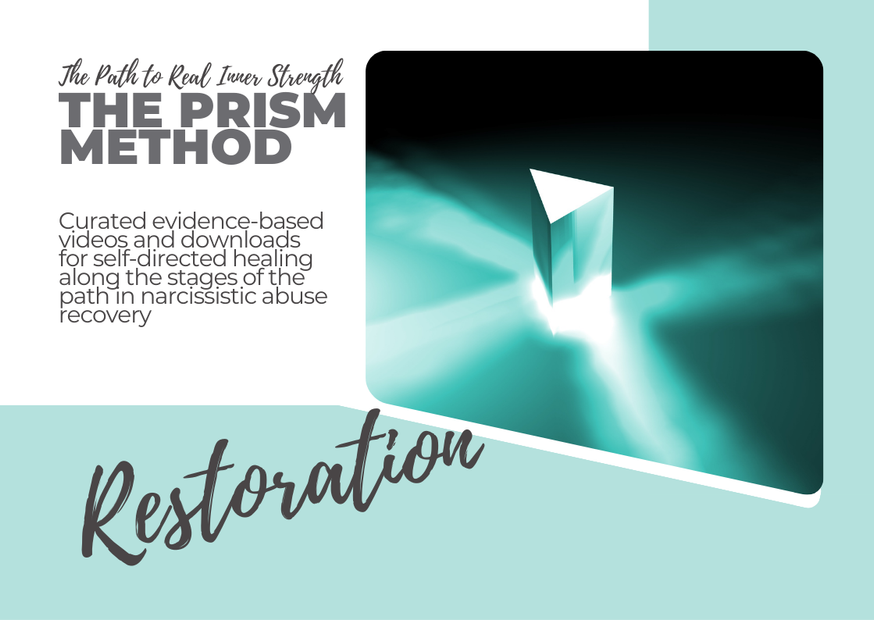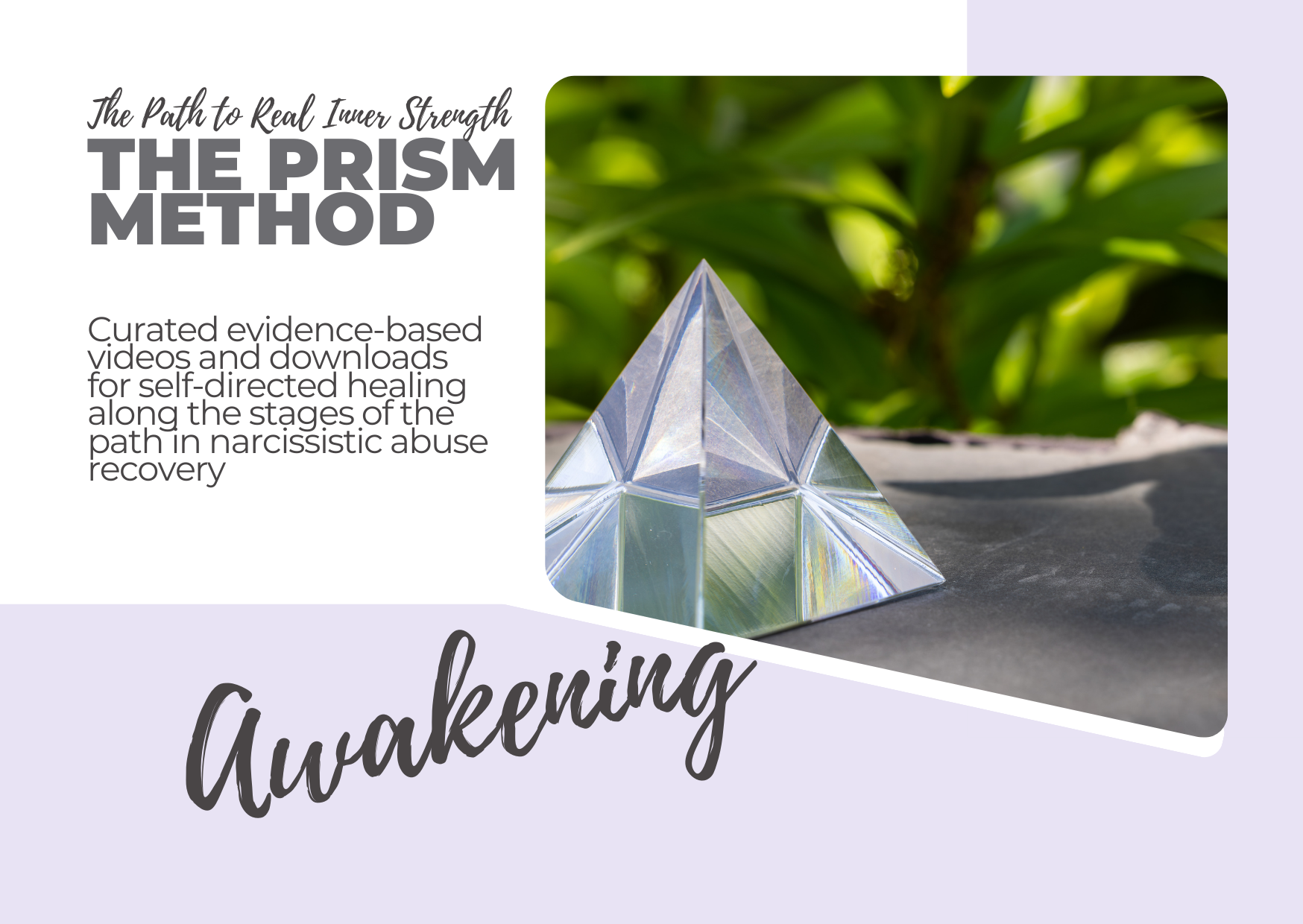
Welcome
Welcome to the PRISM home recovery program. I believe healing involves nurturing our emotional pain with gentleness, guided by strengths-based positive psychology and evidence-based mindfulness practices. At the same time, we explore the complexities of the narcissistic mind, grounding our understanding in scientific research and cognitive-behavioural therapy.
Recovery isn’t one-size-fits-all—it’s okay to try tools, see what fits, and release what doesn’t. If something doesn’t resonate, it’s valid to let that go. Healing is complex and layered—it’s a matrix, not a straight line. These course modules will help you cultivate a stronger connection to your authentic self, empowering you to live a life filled with renewed hope, strength, and enduring peace.
If you’re seeking a strictly clinical, science-only course, this might not be the right fit. But if you're open to a multi-faceted approach—one that blends therapeutic insight with personal wisdom, evidence-based strategies with spiritual depth—then there is much here for you.
What You Get
Gain unlimited access to exclusive and expertly curated videos, research articles, guided practices, book recommendations, therapist- designed worksheets, and journaling exercises.
This course supports your progress, offering guidance from a highly trained clinician for self-directed progress through every stage of narcissistic abuse recovery.
Each module is designed to offer an immersive experience, combining psycho-education and practical exercises equivalent to six counselling sessions, all at an accessible price of $150 per module—far below the typical $900 cost of six in-person sessions. Join me as I empower you to embrace both your personal growth and the challenges that come with it.
Available Courses
In the midst of grief and trauma, often following the sudden loss of everything you once knew to be true, it can feel like the ground has been pulled out from under you, leaving you overwhelmed by a sea of despair. This course offers positive coping techniques for managing insomnia, anxiety, nightmares, confusion, and the deep sorrow of grief.
You may be feeling anxious, hypervigilant, and fearful of what comes next. Setting boundaries is your first line of defence, but for many of us, this is a skill we never learned for various reasons—perhaps it wasn't modelled for us as children, we grew up in environments where our boundaries were ignored or punished, or we learned to feel powerless. Understanding what a narcissistic person might do next can also help us emotionally prepare for what's ahead.
The first step in understanding what just happened is to learn about narcissistic behaviour and the scientific explanations behind why these individuals act the way they do. Recognising that others have endured similar experiences and emerged wiser and more compassionate can offer hope and strengthen your faith in your own healing journey.
The phrase "know thyself" was inscribed on the Temple at Delphi, a concept embraced by many philosophers, from Aristotle to Gautama Buddha, as the foundation for a fulfilling life. By reconnecting with our true selves, we can gain clarity on what we want from life and how we wish to engage with it. Reflect on your core values, aspirations, and dreams, and start creating a new life, step by step. Positive psychology offers the guidance to help you do this.
Your own experience feels like something beyond anything you ever thought could happen to you, especially as a conscientious and agreeable person. Coming to terms with the harsh reality of high-spectrum narcissism can be overwhelming and difficult to bear. This awakening isn’t a gentle realisation, but a jarring shock to the system. It can feel like you’re struggling to catch your breath, only to be pulled under again before you have a chance to truly recover.
For many of us, life as we knew it came to an abrupt end, leaving us stunned and feeling like victims. However, we can rebuild our sense of self, clarify what we want from life, and determine how we wish to show up in the world. From the rubble of shattered dreams and the struggle for survival, we have the power to rise like a phoenix and create a life filled with meaning, purpose, and fulfilment.
PRISM Methodology
The prism method takes a multi-faceted approach to abuse and trauma recovery for women (& other genders).
Fundamental principles of the method are that:
Emotions are felt in the body and are linked to thoughts and memories.
Neuroplasticity allows us to form new neural pathways that, over time, can overlay and transform the traumatic pathways responsible for nightmares, flashbacks, intrusive thoughts, triggers, and rumination.
Many thoughts and beliefs are shaped by past experiences and altering them requires reconditioning and nurturing both the inner child and the adult self.
Sound and ‘the voice of another’ are traditional and powerful tools for regulating the nervous system and the fight-or-flight response.
Understanding and insight are key to trusting a recovery program and believing in our ability to manage our own healing.
Developing a new, positive self-identity is possible alongside trauma recovery, even if it feels uncomfortable or unrealistic to focus on the future while the past dominates our present.
Present-moment awareness, combined with a kind, curious, and compassionate attitude (right mindfulness), as well as familiarity with our core values, is a skill that can be learned through practice, repetition, acceptance, and commitment.
-

Videos
Gain unlimited access to exclusive, expertly crafted videos designed to empower and guide you through the healing process from the trauma of narcissistic abuse.
-

Podcasts
Delivered with firsthand insight, these podcasts blend relatable, everyday language with expert knowledge to explore the unique journey of survivors of narcissistic abuse. They provide a source of strength and understanding, helping to unravel the complexities of trauma while offering a path to healing.
-

Guides & Worksheets
Backed by clinical expertise and scientifically referenced resources, this component offers comprehensive guidebooks and worksheets designed to support your recovery. With a structured framework, you'll be empowered to create a personalized plan, guiding you from the depths of trauma toward a brighter, healthier future.
-

Guided Meditations
Access MP3 downloads designed to guide you through therapeutic mindfulness practices, helping you process your trauma and reconnect with your true self. By practicing regularly, you can rewire your brain, foster self-compassion, and transform negative thought patterns into empowering new beliefs.
About
In ACT, self-disclosure is a tool—not a taboo. This course blends lived experience—shared by Margot MacCallum to foster a sense of common humanity—with evidence-based insights from Nicki Paull, professional counsellor, who draws on over a decade of academic research into narcissistic abuse victimology.
Nicki integrates evidence-based tools with a deep understanding of the psychological impacts of abuse. Her approach draws from CBT, Buddhist psychology and mindfulness, weaving in practices that cultivate compassion, resilience, and self-awareness. Margot brings the equally vital perspective of lived experience. She invites a sense of connection, relatability, and hope.
Margot and Nicki are the same person. If you’re open to a holistic, compassionate approach to trauma recovery, you’ll find support, strength, and hope here.







